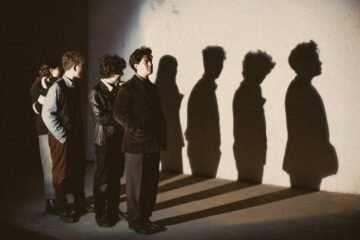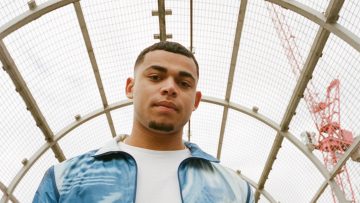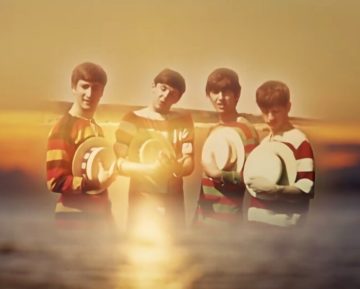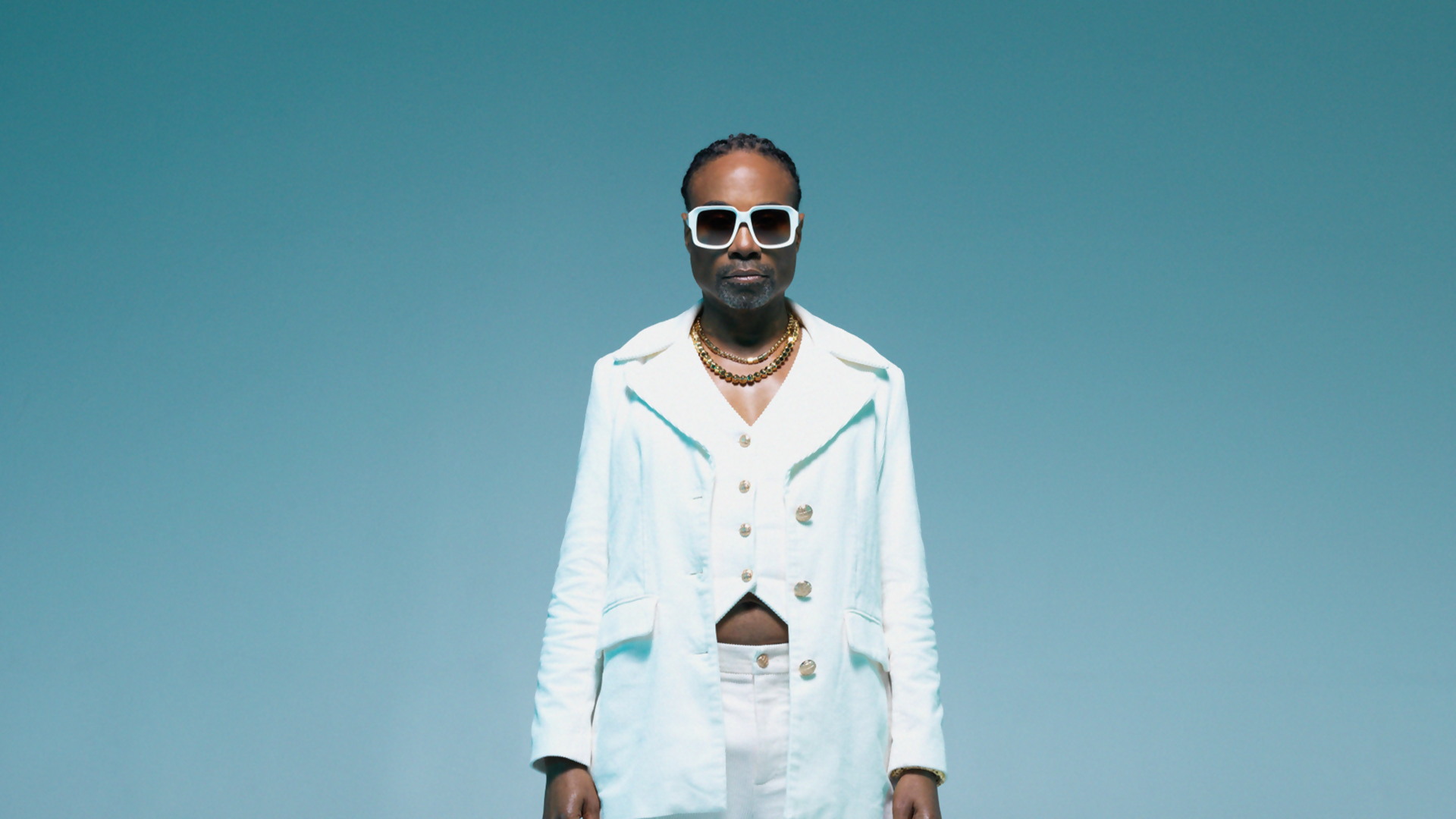
“My return to the mainstream music industry is a surprise,” Billy Porter exclaims loudly from his hotel room in London, where he’s his typical gregarious and outgoing self from the get-go. He says it’s a shock because when he first made a foray into pop music over thirty years ago, he was shut out entirely.
“They kept me out of the [music] industry in the nineties because of my gayness,” he explains, saying the gatekeepers of the industry told him that being gay wasn’t compatible with being a pop star in the public eye. “Everybody told me my queerness would be my liability. But I still chose myself anyway,” he says firmly, swooshing his long hair over his shoulders in a defiant riposte to the prejudice he faced. “I never believed the naysayers. And now, my queerness is my superpower.”
After graduating from college, Porter first tried to make it as a pop and RnB star in the late eighties and early nineties. He says he received just as much discrimination for his skin colour as his sexuality. “There were few gay, Black artists in the mainstream,” he says, “they weren’t anywhere to be seen beyond one or two.” He found, for a time, a unifying space in dance culture instead. “The clubs were the place where we went to for community, where we came to heal during the AIDS crisis,” Porter explains, saying it’s where he found, for a time, some much needed solace. “That’s where we all went – the clubs were like gay church.”
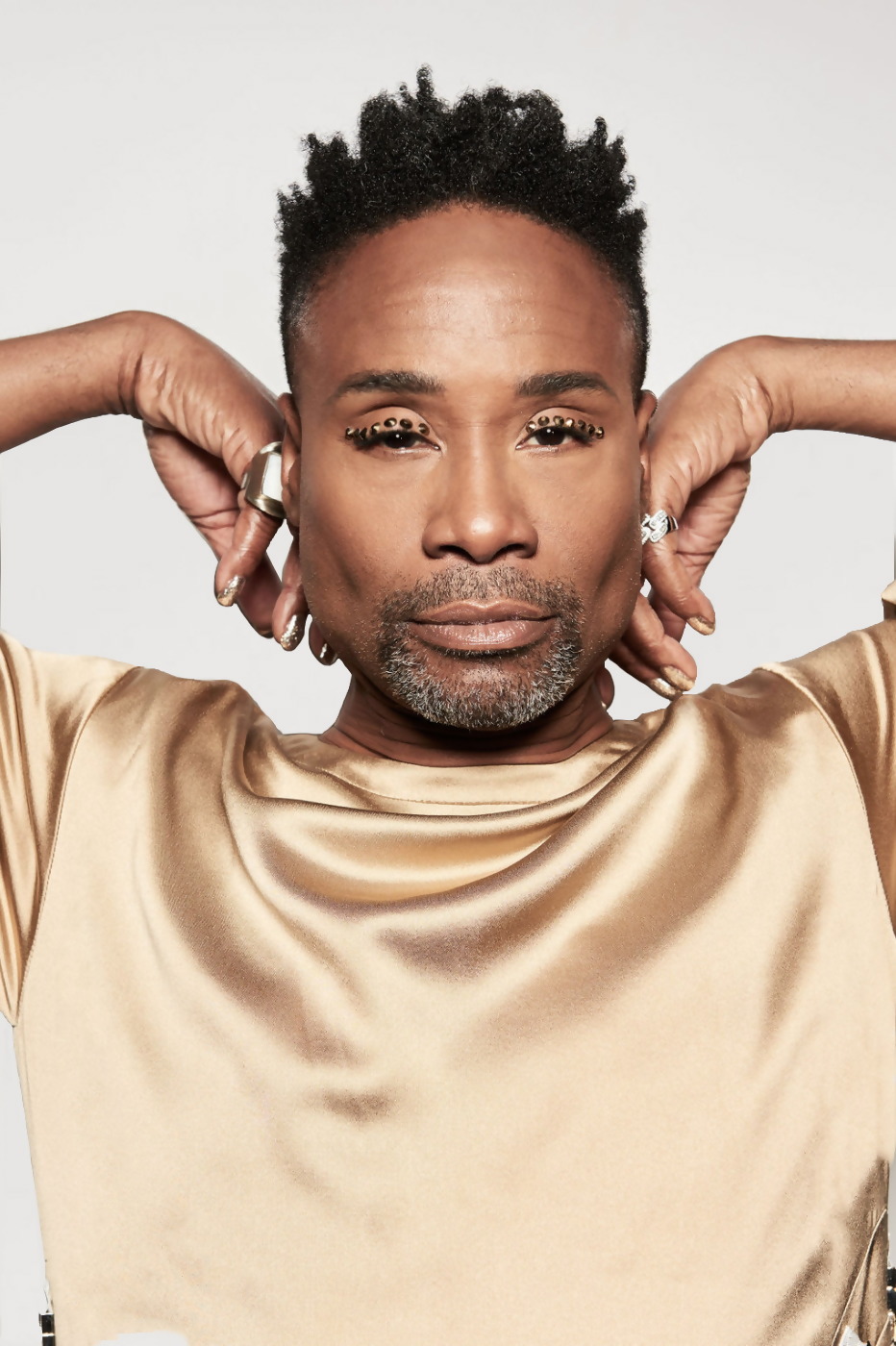
Photo: Meredith Truax
Fast forward thirty years and the Porter speaking to me today is just one Oscar-sized step away from earning coveted EGOT status, having won a Best Actor Tony for his breakthrough role as Lola in the original New York production of Kinky Boots in 2013, and another just last year for co-producing A Strange Loop, which is currently showing at London’s Barbican.
He won a Grammy for Best Musical Theatre Album for Kinky Boots and a Primetime Emmy for his portrayal of Pray Tell in Pose where he became the first openly gay, Black man to be nominated and win in a lead actor category. He also directed his first feature film, Anything’s Possible in 2022: the touching coming-of-age tale was the first major studio rom-com to feature a Black, trans protagonist. Many think it’s only a matter of time before he adds an Oscar to his already long list of achievements. He’s also a fashionista, too, having graced many a catwalk and red carpet: the Met Gala in 2019 was a standout, when he walked the famous carpet in a pair of grandiloquent golden wings.
Today, he’s video calling from his hotel room at the swanky Corinthia in London and he reflects frequently on what it’s taken to get here. He says as soon as his Broadway career took flight, the record labels soon changed their tune about wanting to sign him. “With the powers that be asking me to come back to the mainstream music industry…” he begins, before trailing off, thinking, looking back, and taking his time to formulate his words – something he does often. “I mean, I was done with it,” he admits. “I was perfectly fine doing what I was doing. But to [come back], it was on my own terms, or nothing. Because as you can see, I don’t need them. I don’t need it, I’m good as I am.’”
To return to mainstream music now, Porter says he needed full creative control to make his new album, The Black Mona Lisa. He said it had to reflect every part of his multifaceted identity. “I’m not supposed to be doing one thing, one sound, one style. It needs to be broader because of who I am,” he explains. “In this moment, in my return, the world needs to fucking know who I am.”
He began work on the album back in 2020 with the late songwriter Andrea Martin and initially had a dance-themed album in mind. “It was going to be a throwback to disco, house and dance,” Porter explains, saying it was a throwback to those supportive clubs he visited in his youth. “But that was the album that Beyoncé did, the Renaissance album – that’s what I started out trying to do.” Midway through, while working with Martin, she played him ‘Stranger Things’ – a track he went on to record, plus another which began as “just an idea” then evolved into another song.
He recorded both and, from that realised the album could be something bigger. “There was an expansion that happened inside of the breadth of what it could be, and what it should be, and [I realised] it didn’t have to just be one thing. I’m not one thing. What emerged was versatility, eclecticism and the through line, the cohesive energy to it all is me… I’ve already sung all the genres. There are receipts for all of them,” he laughs. “I performed an unknown Gershwin opera at Carnegie Hall when I was 28 years old, I mean…!” he shrugs and smiles: he knows he has nothing left to prove.
Part of that knowledge reflects the freedom to be heard on The Black Mona Lisa. It’s an ambitious mix of pop, soul, funk, gospel and dance, with genres blending seamlessly into one cohesive whole. Porter’s message of equality and freedom is the album’s beating heart, as is his identity. Buoyant album opener ‘Children’ hears him sing: “some people criticise the way you live, but don’t you apologise… a change starts today,” while the dancefloor-ready new single ‘Broke A Sweat’ sees him encouraging people to be their true selves: “I’m tired of asking for their permission.”
He describes the album and the upcoming supporting show as a “retrospective” of his life. “Because, ironically, it took me 25 years to get the gatekeepers of the industry to take me seriously,” he shrugs. “I went to drama school, one of the best in the world, but it made no difference… the point has always been for me to use my art to transform and heal myself and others. I have to lead now because I’m the personification of what it can be.”
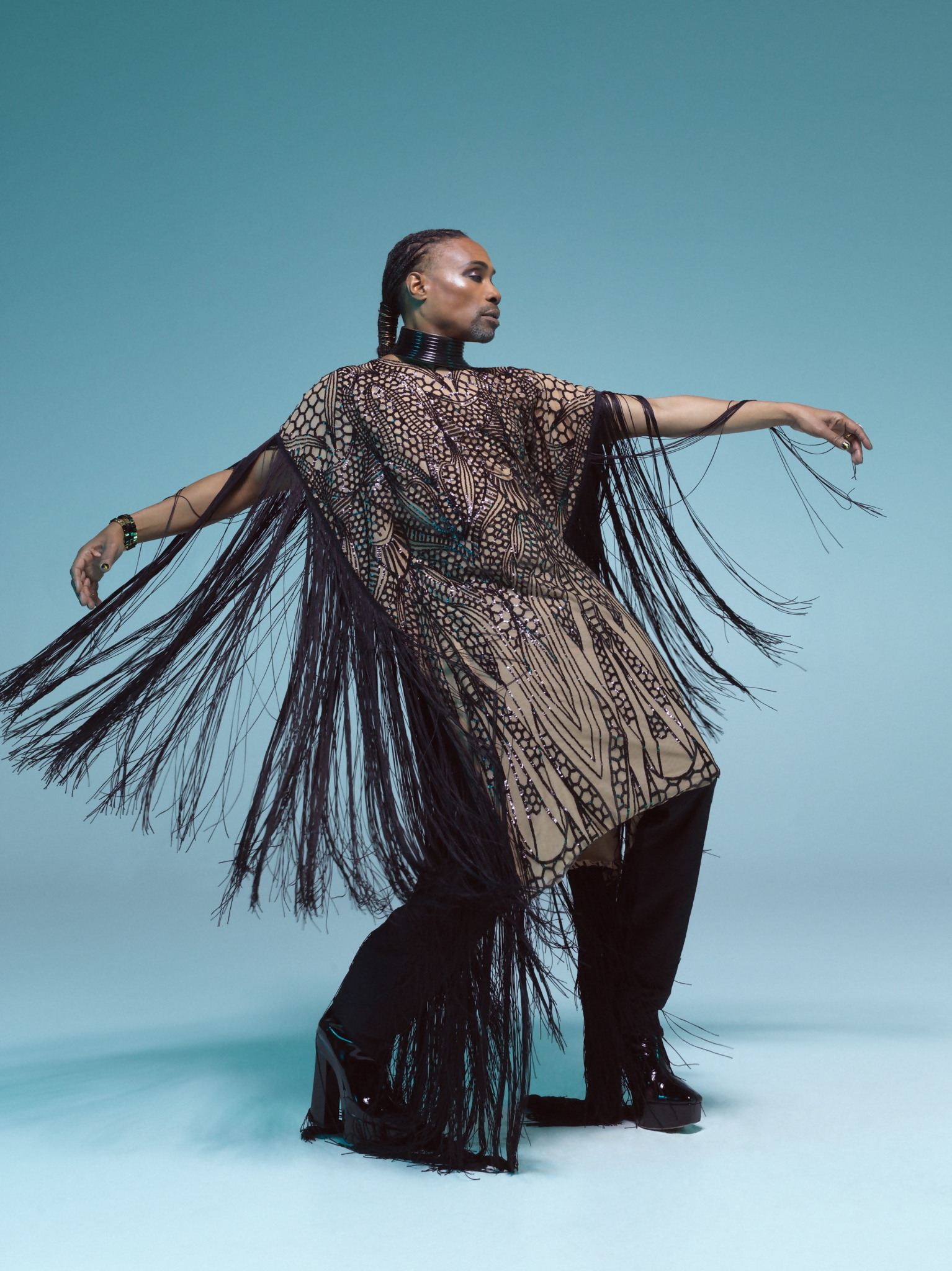
Photo: Franz Szony
Porter spent much of his youth struggling to open-up about his identity at a time where animosity about his skin colour and sexuality was a daily occurrence. He was born William ‘Billy’ Ellis Porter III in Pittsburgh on September 21, 1969, and was raised first by his disabled mother as a single parent, after his father left while he was still in his infancy. In his emotive 2021 memoir, Unprotected, Porter recalled being sent to a psychologist as a young boy for being “an effeminate child.” The doctor said he needed a man around the house, someone to guide him to be more “masculine”. Not long after this, his mother married his stepfather. He would go on to abuse Porter for five years, from the age of seven to twelve.
Porter says the arts were the only thing that saved him from the extreme trauma of that time. “The discovery of the arts was immediately my way out,” he says, emotionally, as he looks back on the unimaginable suffering he experienced. “I was in the thick of so much trauma and I knew the only thing I could do was to get the fuck out,” he says in a whisper, the suffering still palpable.
He was also a target for bullies at school, but once the other children knew he could sing, he says they started to see him differently. “I discovered in the fifth-grade talent show that I could really sing – I won the talent show. The bullying stopped.” Thinking about music night and day helped him to survive, he says. “All I could [think about] was ‘how do I train? How do I get as good as I can get? How do I make connections so that I can get the fuck of this? It’s dangerous for me here and I will not survive if I don’t get out as soon as I possibly can.’ That’s really what it was like for me,” he explains, saying his daily thoughts were consumed with how he would escape the abuse.
After leaving school in 1987, he went on to study drama at Pittsburgh’s Carnegie Mellon University before heading to Broadway. Alongside all the many awards he’s won across his career, he beams at the fact he now has a star on the Hollywood Walk of Fame and a recently created wax figure at Madame Tussauds. However, he says the childhood trauma he experienced means he can’t always celebrate his achievements as fully as he should. “I have my challenges, opening myself up to feel it all, to feel the joy of it all. I have a hard time with joy. I’m still excavating all of that trauma out of my body so that the joy can come in, and I can really feel it.”
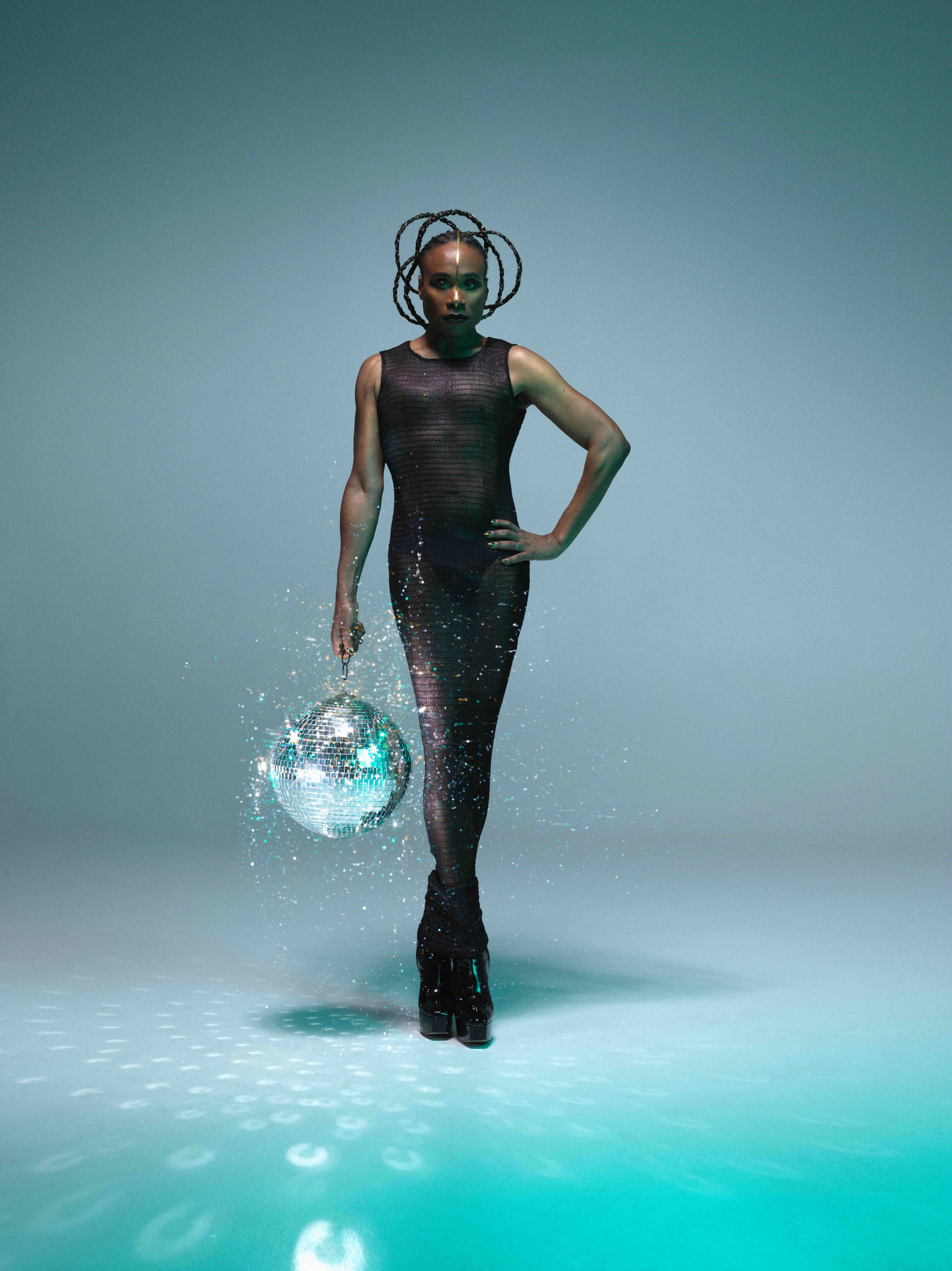
Photo: Franz Szony
He describes his breakthrough role in Kinky Boots as “a dream fulfilled,” saying it brought one of the first ever queer stories to audiences on Broadway at a time where there were few such roles for actors. He says he reflected on this a lot earlier this year, when Broadway performers Alex Newall and J. Harrison Ghee became the first openly non-binary actors to win Tony awards.
“That was because of me and my generation,” Porter explains, saying he thinks his generation’s tenacity and refusal to accept the status quo changed things. “I couldn’t stop weeping, you know, because when I came out, there was nothing for us to do. There were no parts for us; there were no roles for us. There were no real three-dimensional human beings for us to get on stage and play.”
He says back in the eighties and nineties, “shame and silence were killers” when it came to coming out and people trying to repress the LGBTQ+ community in all walks of life when they attempted to “tell their truths.” Porter recalls calling it out at the time. “The whole point from the power structure was them wanting us to ‘shut up’. I think about their buzzwords in society, the politicisation of ‘you’re telling me to shut up because… I dare to call you fucking out. You’re telling me that I’m politicising something to shut me up.’ I will never shut up about it.”
“I’m not supposed to be here like this,” he continues, saying if the “powers that be” had their way back in the eighties, a Black, queer man would still be silenced today. “That’s really the whole point, like how dare I, as a Black fa**ot in America, stand in my truth, stand in my authenticity, dare to speak out and dare to live my fucking life. How dare I, right?’
“In this world, the buzzword is ‘shut up’ for [people like me],” he continues. “I don’t want to hear that. Shut up? Fuck y’all… There’s a rage inside of me. Having lived that, I get to navigate and heal through my art and it allows me to be of use. Vomitus rage is not useful, but it fuels the necessity to engage and demand justice in this world.”
He says he wants his life to be mirrored in his art, with it delivering a message to others that you must always be true to all facets of your identity, even when people try to silence you. “We have to tell the truth,” he says. “We have to be present and stand in the truth and start telling our truths,” then he says, more stories will be heard. “I’ve just sold three pieces all about Black, queer joy,” he says of some new projects he’s been working on. “It’s about engaging, putting one foot in front of the other and staying open… and never forgetting to tell those truths.”
In 2021, Porter opened up publicly about a truth he’d been living with for fourteen years: he’d been diagnosed with HIV in 2007. It’s something that’s reflected in his Pose character too as an HIV positive survivor. He can’t talk about the show today because of the ongoing writer’s strike in the US which he is supporting (he’s heading to the picket line as soon as he returns to America, he says), but he does talk about the “responsibility” that has come with his revealing of the diagnosis, particularly how he’s helped others to come to terms with their own diagnoses, and not just to survive with it, but thrive.
“It’s humbling,” he says, becoming teary and taking his time to articulate his words. “It’s hard for me to speak about sometimes.” He says it’s “necessary” and “a calling” to speak about living with HIV and he says he’s been overwhelmed by the positive response he’s received. “I went to number one recently, on the charts at 53 years old. I don’t have words for that. I don’t understand it, and I feel so blessed right now with it, so full. These are tears of joy, of gratefulness for it all… I’m trying to be a healer. I go out to minister to people through my work.”
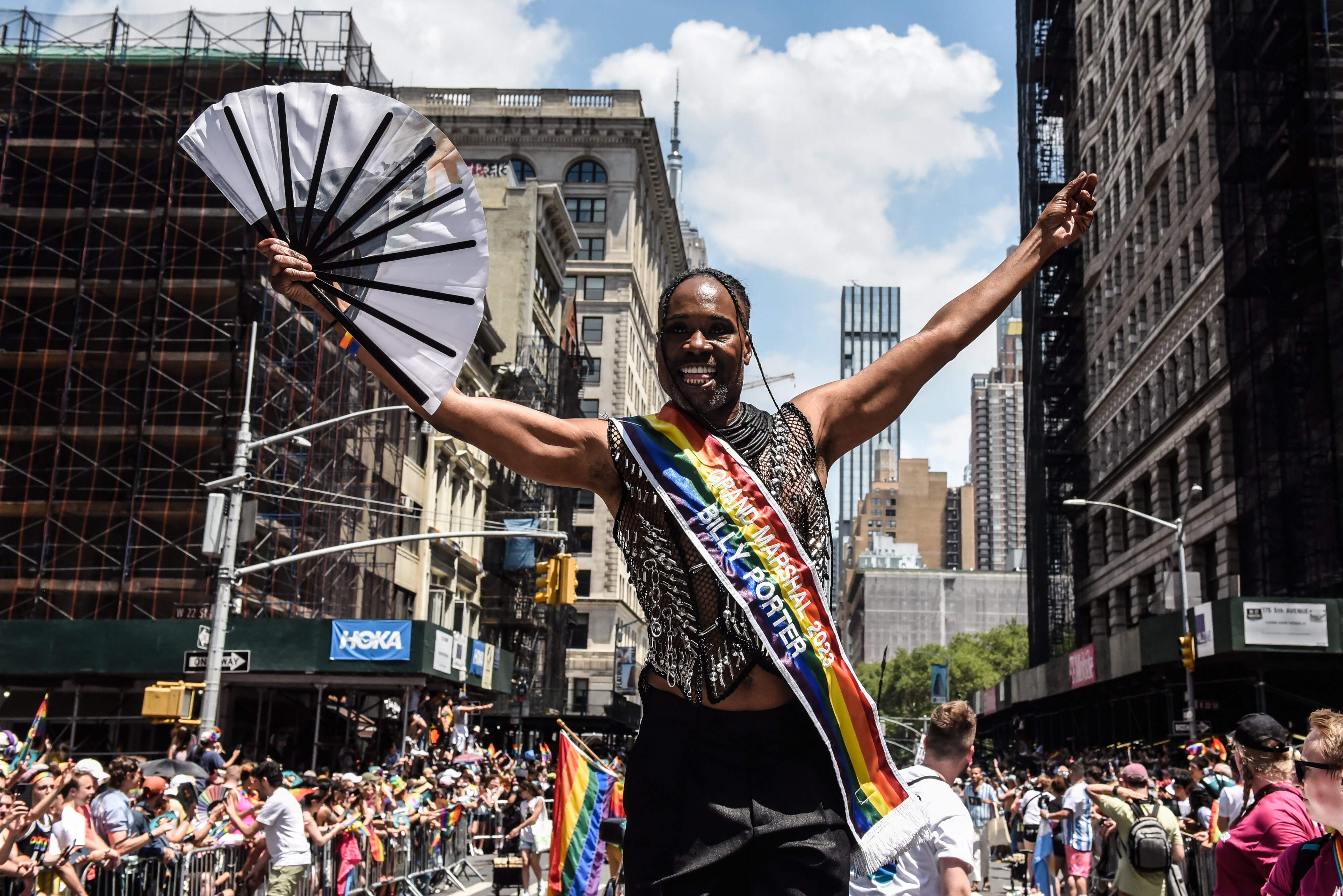
Photo: Stephanie Keith
In June, Porter was also the Grand Marshall at Pride in New York – another big moment in his career. “What I loved about this particular pride in New York was that there was a remembrance that Pride started as a protest,” he says. “[They partied] too, but more importantly, people remembered where it began,” saying it looked back to Pride’s roots at Stonewall in 1969, where members of the LGBTQ+ community were targeted by the New York police department.
He says Pride can be a “complicated” celebration for him too because he still sees that “there’s still a lot of posturing from companies who want to placate our community, but who don’t want to actually really engage,” he explains, saying this is why protest and activation is still vital for the community to ensure people truly work with the LGBTQ+ community to bring meaningful change. “We need commitment,” he affirms. “There was a split between the old guard and the new guard [between those who want to protest and those who want to party] but [this year] there was a remembering that ‘this is how we activate’. Kids were doing it. That was encouraging and inspiring.”
Porter is due back in the US soon, joining the picket line for the writer’s strike. He references the widely circulated quote that’s allegedly from an unnamed Hollywood executive who reportedly said: ‘we’re going to starve them out until they have to sell their apartments.’ In Porter’s case, that literally is true as a new movie and television show he was meant to start in September is now not happening and he’s having to sell his home as a consequence.
He’s relying on money from his upcoming album and tour instead, he says. “I need people to buy the album. I need people to come to my concert. I need people to play me on the radio. I need to be selling out stadiums within three to five years – because it’s time for me to make some fucking money, because I don’t know where this world is going.”
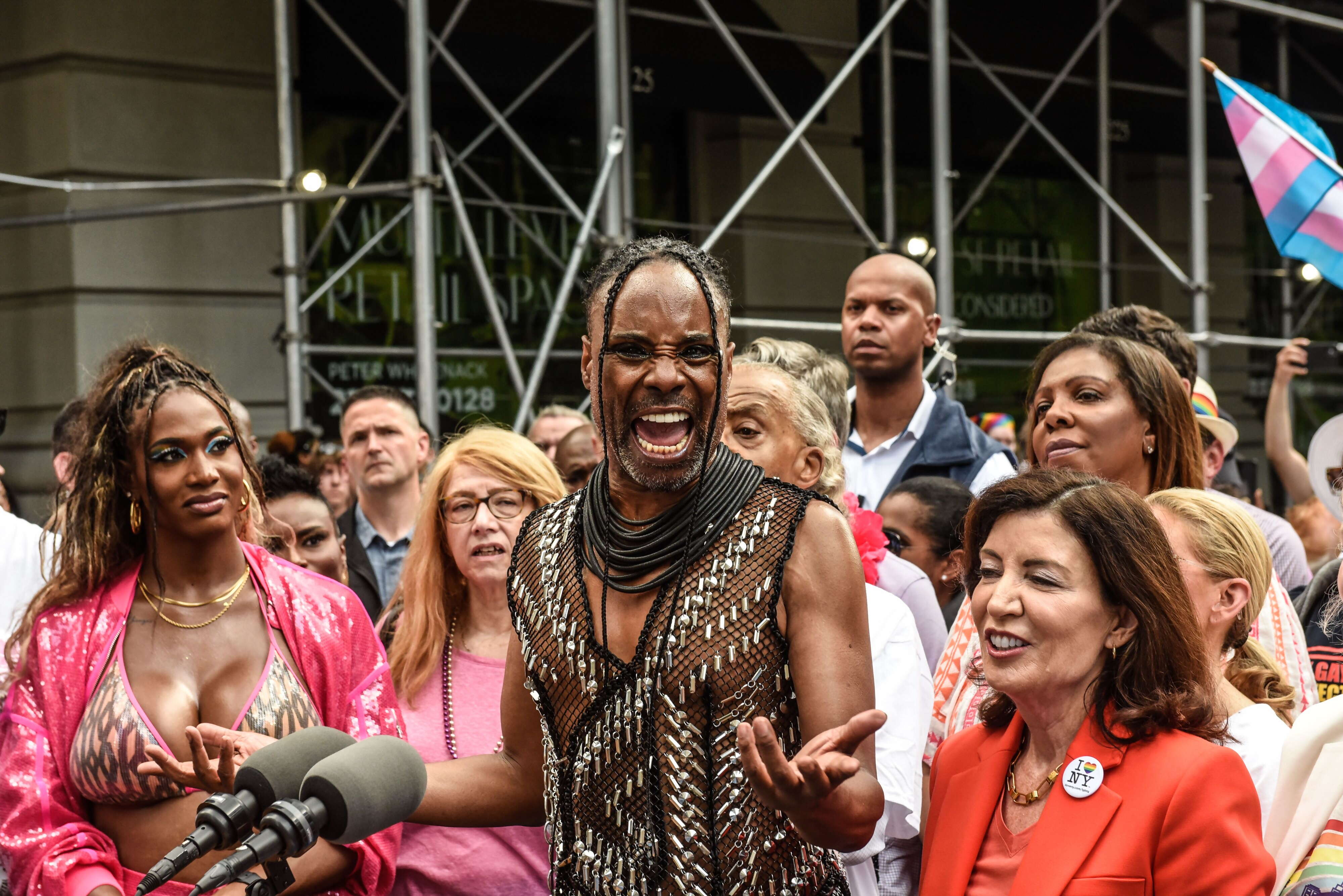
Photo: Stephanie Keith
He’s also navigating a divorce from his long-term partner – something Porter could have been exploring in his recent film with Luke Evans, Our Son, where the pair play a couple navigating a divorce and the custody of their child. For now though, he seems to be focussing firmly on the music. “I’m in the driver’s seat, I’m in the power position now,” he smiles. “I am in a leadership position on this earth. It’s my calling, my purpose, my ministry. I’m blessed to go out into the world and do that with my art – and that’s the whole point for me… I just have to show up and do my job, and it reverberates. The power of it reverberates.”
Ultimately, he says, his latest project is a celebration, before singing some lines to his album closer, ‘Audacity’. He bursts into a soulful rendition of the song: “You are worthy,” he croons melodically. “And that’s the whole point,” he smiles. “It’s a celebration of life, love, hope, joy and peace and all of those things that we seem to have forgotten. It’s about empowering yourself, being true to yourself… and, well, I’m just so happy I’m back on stage playing me,” he smiles, “singing my truth.”


